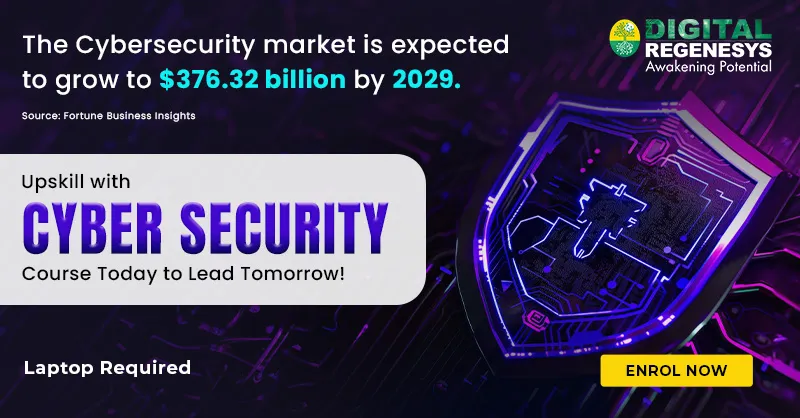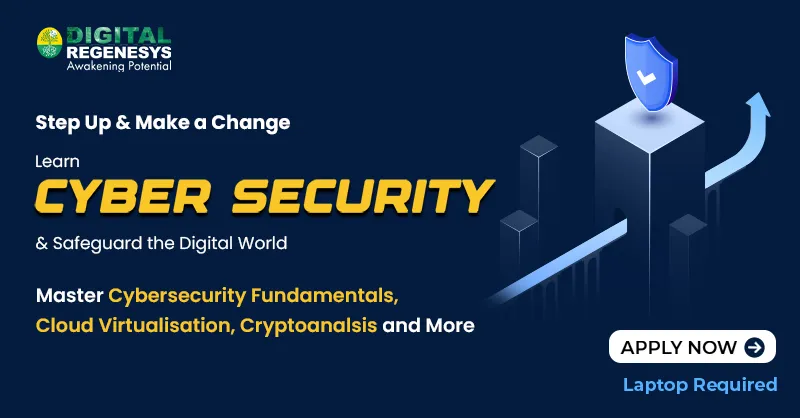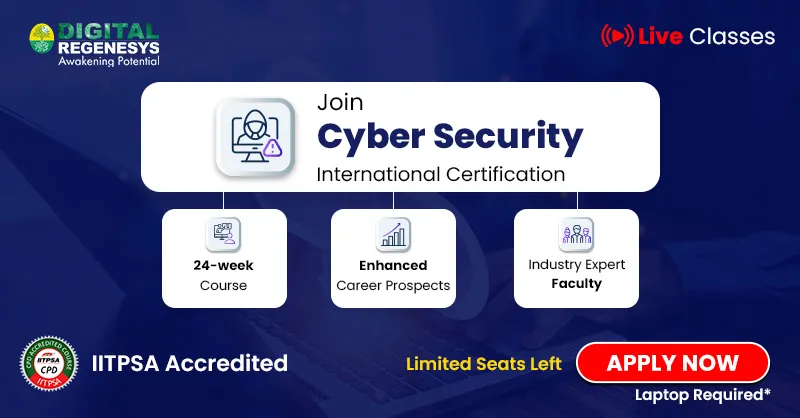Can I Learn Cybersecurity on My Own?

The question many beginners ask themselves is, “Can I learn Cybersecurity on my own?” Short answer: Yes.Most learners begin independently, exploring free resources, practising on simulated platforms, and slowly gaining confidence.
However, to become job-ready, you will require structured learning, practical insight, and recognised training-especially in a field where hands-on ability and clear understanding of systems are expected from employers.
The article goes into what one can self-learn, the skills involved, common learning pathways, and how Digital Regenesys supports a beginner in finding reliable means of growing in this career.
Understanding What Self-Learning Can Achieve
Cybersecurity is a wide and ever-evolving field.A motivated learner can study tools, simple defensive techniques, common threats, and exercises on their own. Free tutorials, community discussions, and online labs will allow the beginning user to be oriented with real situations.
There are a few challenges of learning alone: Without guidance, it may take longer to understand how the concepts fit together.Many learners also find it difficult to identify what to study first, which areas matter most, and how to measure their progress.
In this regard, a structured pathway is useful, particularly if your goal is employment in the field.
Read More: How to Start a Career in Cyber Security After 12th

Can Self-Learning Build Enough Knowledge?
While practice and curiosity are commendable, employers usually need the theoretical understanding to be combined with practical skills. To this end, most learners combine independent study with structured training.
Digital Regenesys supports this through its Certification Course in Cybersecurity. The course guides learners in understanding the core concepts while still allowing them to apply their independent learning and personal interests.
Why Many Learners Start on Their Own
Many beginners prefer to start their Cybersecurity learning independently. The internet offers countless articles, videos, and tools, making it easy to experiment without pressure. Self-paced learning also gives room to revisit concepts until they make sense. There are a few reasons why many make self-learning their starting point:
- Ease of access to Web content
- Flexible studying time
- Ability to practise at your own pace
- Opportunity to explore areas of personal interest
These benefits make for easier first steps, but once the learning journey becomes more complex, professional guidance helps to connect the dots and keeps your knowledge relevant to employer needs.

Important Features to Consider
Since many beginners have to answer the question ‘Can I learn Cybersecurity on my own?’, it is important to understand realistically what self-study includes. Here are the key factors that will determine exactly how far self-learning can take you:
1. Building a Strong Foundation
Cybersecurity relies on comprehension of the fundamentals of networking, operating systems, system behaviour, and digital threats.Independent learners can study those topics in tutorials, introductory videos, and reading materials.
To reinforce this bedrock further, structured courses serve to tie key concepts back to legitimate organisational requirements.
2. Practice Builds Technical Skills
Hands-on practice is very crucial. Free labs, open-source tools, and community projects will help a person learn basic monitoring, scanning, and analysis. That is a good starting point, but practical work under guided instruction will help one get clarity in unfamiliar areas and avoid picking up the wrong habits.
3. Understanding Real-World Scenarios
Online content exposes you to examples and simulations, but real-world threats involve more complexity. Guided learning helps deepen your understanding by showing you how professionals approach investigations, responses, and prevention strategies.
4. Knowing when to seek out structured training
While self-learning gives flexibility, industry-relevant skills can only be attained through structured programs that include assessment, feedback, exposure to real tools, and professional guidance.
Read More: What qualifications do I need to study cyber security?
Essential Skills You Can Learn Independently
Your learning journey can start with the essential topics that form the first layer of Cybersecurity knowledge. These early concepts help you grasp how systems operate, where weaknesses appear, and what professionals look for when assessing risks. Starting with these fundamentals also makes advanced concepts far easier to absorb later.
With that in mind, here are some essential areas you can explore at the beginning of your learning journey.
1. Basic Networking Concepts
Understanding networks helps you visualise how information flows, where attackers strike, and how systems react.
2. Operating Systems, especially Linux
Many of the cyber tools run on Linux. Knowing the basics helps you work comfortably with real systems.
3. Fundamentals of Security
Core concepts such as confidentiality, integrity, and availability build your awareness of how security decisions are made.
4. Common Cyber Threats
Most of the risks you can independently study include phishing, malware, denial of service attacks, and identity theft.
5. Basic Tools and Techniques
Online sandboxes, scanner tools, and simple labs help you practice safely.
These topics create the right starting point for more advanced learning later. As you progress, you will find it easier to connect new concepts to what you already understand. This will make your learning journey smoother and more structured.

Can I Learn Cybersecurity on My Own and Still Build a Career?
Building a career is possible, but self-learning alone may not be adequate.Employers look for practical understanding, exposure to real tools, and a clear learning record.
Many learners begin with independent learning and then move into a more structured course to provide direction, industry relevance, and confidence.
Digital Regenesys provide this pathway through its Certification Course in Cybersecurity. The course assists the learner in understanding system protection, digital risk management, organisational security, and the various tools applied in the workplace in South Africa.
Read More: Why Enrol in an Online Cybersecurity Short Course?
Where Independent Learning Fits
Self-learning helps you build confidence at your own pace and explore topics that genuinely interest you. Many beginners find that this approach builds early confidence and curiosity, which are both important in a field that evolves quickly. To understand how this fits within the broader learning journey, here’s a look at what self-learning offers and how structured training complements it.
- Explore new areas
- Develop curiosity
- Grow at your own pace
- Build early technical confidence
Meanwhile, Structured learning helps you to:
- Acquire certified knowledge.
- Prepare for Workplace Needs
- Apply skills to real scenarios
- Learn from experienced instructors
- Enhance your job prospects
Together, these complementary approaches establish a firm foundation.

Steps to Teach Yourself Cybersecurity
Many learners ask not only, “Can I learn Cybersecurity on my own?” but also, “How to begin?”.Below are simple steps that will guide you from basic understanding to confident practice.
Step 1: Start With the Foundations
Learn about basic IT concepts, such as how devices connect, communicate, and store information.This provides a better understanding of how, from a behind-the-scenes vantage point, systems operate and why specific weaknesses exist.
Step 2: Explore Security Principles
Take time to understand organisational security, risk, encryption, and common threat categories. These topics will show you how security decisions are made and why certain controls are necessary.
Step 3: Practise with simple tools
Begin using free tools that allow you to scan systems, monitor activity, and review basic logs. These practical exercises help you recognise what normal and suspicious behaviour looks like.
Step 4: Reinforce Your Knowledge with Guided Learning
A structured Course connects your self-study efforts to professional standards and industry expectations. Digital Regenesys training supports practical understanding while helping you prepare for real security challenges.
Step 5: Establish a Learning Routine
Cybersecurity is constantly evolving, so ongoing education is required.By building a routine, one is continuously updated and increases their knowledge step by step, without experiencing burnout.
What About Degrees or Formal Backgrounds?
Many newcomers also question whether studying IT formally is necessary to get into the profession. It is not necessary. Those who start with a Learn Cybersecurity without a degree approach can still build meaningful careers, provided they gain the right knowledge and practical skills.
But structured learning does cut down on your learning time, defines your path, and prepares you to work in real-world systems.
How Digital Regenesys Supports Self-Learners
Digital Regenesys has designed the Certification Course in Cybersecurity with support for beginners wanting clear guidance, practical activities, and learning aligned to industry needs.
Learners study key areas including:
- Network defense
- System protection
- Digital risk management
- Security controls
- Threat awareness
- Real-world case examples
The course provides structure for your independent learning that allows you to understand the workplace expectations and gain confidence in applying your skills.

Conclusion
Well, can I learn Cybersecurity on my own? Of course, you can start on your own, develop early skills, and look into the practical application of tools. However, a clear direction, structured training, and professional guidance make the journey truly effective.
Cybersecurity is a great field, and with great demand, especially in South Africa, the right balance between self-learning and guided instruction helps you grow in confidence.
The Cybersecurity course at Digital Regenesys offers a structured and practical learning route for those who are ready to take the next step in starting their journey with clarity and purpose.
Enrol with Digital Regenesys and take your first confident step into the Cybersecurity field.
Last Updated: 12 January 2026